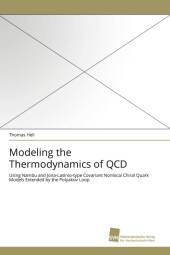 Neuerscheinungen 2010Stand: 2020-01-07 |
Schnellsuche
ISBN/Stichwort/Autor
|
Herderstraße 10
10625 Berlin
Tel.: 030 315 714 16
Fax 030 315 714 14
info@buchspektrum.de |

Thomas Hell
Modeling the Thermodynamics of QCD
Using Nambu and Jona-Lasinio-type Covariant Nonlocal Chiral Quark Models Extended by the Polyakov Loop
2010. 172 S. 220 mm
Verlag/Jahr: SÜDWESTDEUTSCHER VERLAG FÜR HOCHSCHULSCHRIFTEN 2010
ISBN: 3-8381-2046-9 (3838120469)
Neue ISBN: 978-3-8381-2046-1 (9783838120461)
Preis und Lieferzeit: Bitte klicken
Strongly interacting (QCD) matter is expected to exhibit a multifaceted phase structure: a hadron gas at low temperatures, a quark-gluon plasma at very high temperatures, nuclear matter in the low-temperature and high-density region, color superconductors at high densities. Most of the conjectured phases cannot yet be scrutinized by experiments but are based on model calculations. This monograph investigates the phases of QCD using a nonlocal covariant extension of the Nambu und Jona-Lasinio (NJL) model. This allows one to take into account the running of the QCD coupling strength at high and instanton physics at low energy scales. Gluon dynamics is implemented at finite temperatures and densities by coupling the nonlocal NJL model to a gluonic background field (expressed in terms of the Polyakov loop P). The thermodynamics of the resulting PNJL model describes both the chiral and the color-deconfinement transition. We obtain results in mean-field approximation, and extend them by including mesonic contributions to thermodynamic quantities. The phase-diagram region of finite density is investigated. A derivation of the nonlocal PNJL model from QCD first principles is also given.
Thomas Hell, born in 1983 in Merano (Italy). After finishing in2002 the "Scientific Gymnasium" in Merano he studied physics atthe Technische Universität in Munich. In 2007 diploma in physics,with distinction. From 2007 to 2010 Ph.D. studies inthermodynamics of strong interactions supervised by Prof. W.Weise. In 2010 Ph.D., "summa cum laude".


